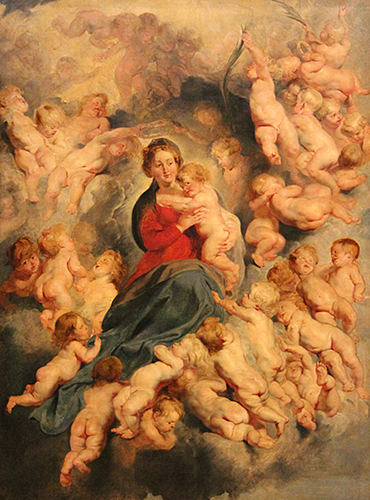Feast of the Holy Innocents – Mt 2:13-18
As we make our way through the Christmas octave, we come to another, perhaps more difficult, feast: that of the Holy Innocents. There’s a lot we could say about this feast, like how it reminds us of the preciousness of life, and how no one is too young to bear witness to Christ and His kingdom, but one of the most important thoughts we can consider is how the birth of Christ makes sense of innocent suffering.
There are many mysteries in the world, and certainly one of the most difficult to understand is why the innocent must suffer. It would seem that people should suffer because of their sins, but oftentimes, we see this isn’t the case: the sinful get off easy, and the innocent suffer, and, in a particular way, children. On one hand, this follows from being a part of humanity; since in Adam all sinned, in Adam, too, everyone must share in the wages of that sin: death, suffering, and sorrow.
Yet, after Christ’s coming, the suffering of the innocent takes on new meaning. Christ Himself had no sin, and thus the innocent, in their sufferings, imitate Christ in a particularly powerful and profound way. If they are offered to God, those sufferings bring about the work of sanctification and purification of the sins of others. As Blessed Carlo Gnocchi put it, “Every child who suffers is therefore like a small, precious reliquary of the Christian redemption, which is brought about and renewed in time, for the expiation of the sins of each day.”[1] In other words, a child or any innocent person who suffers is like a re-presentation of Calvary: in their pains and sufferings, Christ is made present again, and particularly in their sufferings graces can be obtained for the conversion and sanctification of many.
“‘Rabbi,’ the disciples asked at the sight of a man born blind, ‘who sinned, this man or his parents, that he was born blind?’ ‘Neither he nor his parents sinned,’ replied Jesus, miraculously restoring his sight, ‘it is so that the works of God might be made visible through him’ (Jn 9:2-3).
The suffering of the innocent, in the mysterious Christian economy, is also for the manifestation of the works of God and those of man: the works of science, mercy, love, and charity.”[2]
Let us pray, through the intercession of the Holy Innocents and Mary, the Mother of God, for the grace to unite ourselves and our sufferings to Christ, and thus become participants in His work of redemption.
[1] Carlo Gnocchi, The Pedagogy of Innocent Suffering. Trans. Nathaniel Dreyer. Chillum, MD: IVEPress, 2017, 30. This book is a must read for those who seeking an explanation to the question of innocent suffering.
[2] Ibid., 51.





